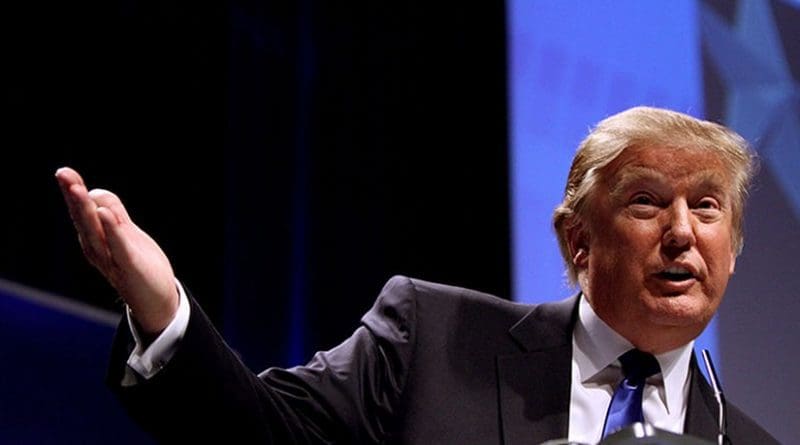Robert Reich: Trump’s Trickle-Down Populism – OpEd
By Robert Reich
Last Thursday President-elect Donald Trump triumphantly celebrated Carrier’s decision to reverse its plan to close a furnace plant and move jobs to Mexico. Some 800 jobs will remain in Indianapolis.
“Corporate America is going to have to understand that we have to take care of our workers,” Trump told The New York Times. “The free market has been sorting it out and America’s been losing,” Vice President-elect Michael Pence added, as Trump interjected, “Every time, every time.”
So what’s the Trump alternative to the free market? Bribe giant corporations to keep jobs in America.
Carrier’s move to Mexico would have saved the company $65 million a year in wages. Trump promised bigger benefits. The state of Indiana will throw in $7 million, but that’s just the start.
Carrier’s parent company, United Technology, has military contracts that just last year generated $6.8 billion of its $57 billion in revenue – creating a yuge Trump card that makes $65 million look like peanuts. If Trump comes through with the military buildup he’s promising, United Technologies could reap a bonanza. You can bet that figured into the deal.
In addition, United Technologies has more than $6 billion parked abroad where tax rates are low. It will make a bundle if Trump follows through with a plan to allow global corporations to bring that money home and pay a rock-bottom tax rate.
In other words, Trump will get corporate America to take care of “our workers” by bribing them with government contracts, tax cuts, and relief from regulations. The art of the deal is to Increase corporate profits, and assume that corporations will reciprocate with good American jobs.
It’s “trickle-down” economics dressed in populist garb.
But it won’t work. As long Wall Street continues to push corporations to maximize shareholder returns, American workers will continue to lose good-paying jobs to foreign workers or to homegrown robots.
Payrolls are the biggest single cost on most companies’ balance sheets, so cutting jobs and wages will continue to be the easiest way to boost profits and share prices.
If Donald Trump were serious about reviving good jobs in America, he’d give workers more bargaining power by strengthening trade unions, upgrading lifelong education and training, and simultaneously making it harder for Wall Street to demand that companies shed workers.
This was the way the American economy functioned from the end of World War II through the early 1980s, when jobs and paychecks rose in tandem with corporate profits. Large corporations weren’t just responsible to their shareholders; they were also responsible to their workers.
They treated workers as assets to be developed – retraining them with higher skills as the companies moved to higher value-added production, or for new jobs as the companies expanded – and resorting to layoffs only as a last resort.
But starting in the 1980s, workers became costs to be cut. Corporate raiders mounted hostile takeovers – using high-yield junk bonds, leveraged buyouts, and proxy fights to gain control of companies – and then squeezed payrolls to get higher profits. They busted unions, outsourced jobs abroad, and installed automated equipment.
American manufacturing employment peaked in 1979 at nearly 20 million jobs. Since then, about 8 million of those jobs have been lost to cheaper foreign labor or to automation.
Trump won’t change these economic fundamentals. How do I know? Because his cabinet choices for key economic posts were among the ring leaders in the changes I’m talking about.
Steven Mnuckin, his Treasury pick, is a former Goldman Sachs partner who made billions over the past decades buying up companies and slashing payrolls. Wilbur L. Ross Jr., Trump’s pick for Commerce Secretary, made his billions using bankruptcy to protect wealthy owners while leaving workers and communities holding the bag. (Example in point: the collapse of Trump’s casino empire.)
These men exemplify the financialization of the American economy that’s focused only on high profits and rising share prices, and shafted American workers.
Trickle-down economics dressed in populist garb is still trickle-down economics.


Although I usually disagree with Mr. Reich, he’s got a few good points here and the entire situation is indeed very troubling. Of course, we’d expect a 1930s socialist like him to recommend first that we upgrade unions – the very entities that made moving jobs abroad desirable to large corporations in the first place.
But my real comment is to point out to the learned professor that incentives such as the one Indiana gave United Technologies to encourage them to stay here are actually fairly common. As he says “bribing them with government contracts, tax cuts, and relief from regulations” was a Democrat-inspired approach to lure and keep companies in whatever jurisdiction was giving these goodies away. Certain jurisdictions – like New York and New York City – doubled up to make some corporation stay put (and I’d wager that the corporation leadership was very “friendly” with the Governor and the Mayor.)
So don’t denigrate Trump (for whom I did not vote). As is his way, he created a sexy news item by using the available tools at hand – the ones Reich and his associates thought were such good job-saving ideas a generation ago. It’s time to come up with new ones, Mr. Reich.